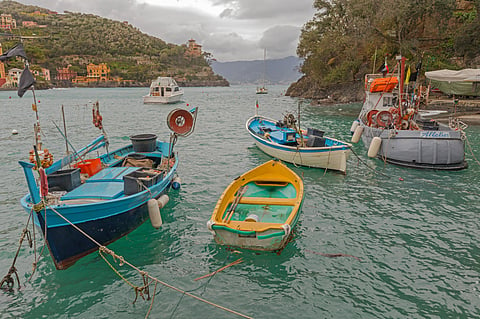

Fishing boats in Portofino, Italy.
Photo: Adobe Stock.
Environmental and marine groups are calling on the European Union and its Member States to properly enforce the EU’s Common Fisheries Policy to tackle what they describe as "unintended consequences" of current practices and "ensure a just transition to low-impact and fair fisheries".
The call comes with the release of a new report, “Power structures shaping EU fisheries”, published by Seas At Risk together with several other marine NGOs. The study says that the way current fisheries rules are applied tends to benefit large industrial fishing companies while making life harder for smaller, low-impact fishers.
According to the report, small-scale fishers make up 76% of fishing boats in the EU and represent 50% of the fishing workforce. Despite this, they often struggle with low wages, part-time jobs, and limited input in decisions that affect their livelihoods.
The report also argues Europe's small-scale fishers are at a disadvantage when it comes to applying for government subsidies, which are more accessible to large companies with more resources.
The NGOs argue that the problem is not with the EU laws themselves, but with ineffective enforcement, noting that the rules already allow governments to allocate fishing quotas based on social and environmental benefits, not just past catch levels. However, most countries do not use this option, the authors say.
The report highlights a trend towards fewer, but more powerful, fishing boats in the EU. Between 2013 and 2021, the number of vessels fell by 11% and the number of full-time fishers dropped by 20%. Meanwhile, the remaining boats became larger and more industrial, a change the NGOs say is damaging to both the environment and coastal communities.
“The Oceans Pact, soon to be released by the European Commission, must tackle the inadequate enforcement of current fisheries policies and establish a strong, meaningful plan to support low impact (mostly small scale) fishers," Monica Verbeek, Executive Director at Seas At Risk, said in a press release, calling the pact "the much needed first step in the transition to low impact fisheries."
Bruno Nicostrate, a senior fisheries expert at Seas At Risk, added: “Although EU fisheries regulations are comprehensive, insufficient implementation and oversight undermine their effectiveness, leading to unintended consequences.” He said stronger enforcement is essential to ensure fair pay for fishers, protect coastal communities, and safeguard the marine environment.
The European Commission is currently reviewing its fisheries policy, with public consultations underway, and a final report expected in 2026.
Seas at Risk's release of its report echoes recent calls by Low Impact Fishers of Europe (LIFE), which in March organised an event at the European Parliament making the case for fairer access to fishing rights, and a separate study by the Marine Biological Association urging the UK government to make full use of the 2020 Fisheries Act to safeguard the future of small-scale fisheries and coastal communities.
